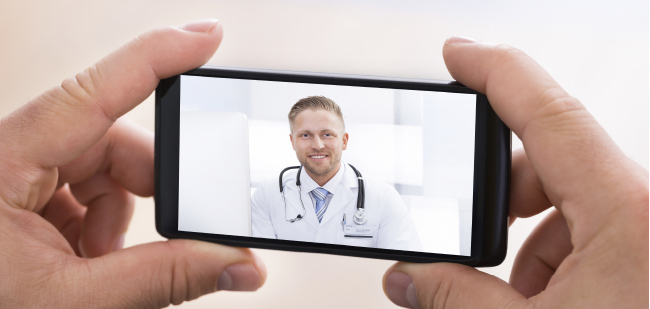Telemedicine is not necessarily something brand new, but it is becoming a lot more prominent in this age with the increase in technology overall. During my show-and-tell, I presented a telemedicine website and app called Amwell. Amwell is a telemedicine app where you simply put in your personal information, insurance information, and concerns, and then a doctor will video call you when it's your turn. It's basically like a normal doctor's visit, but it can happen wherever you want! There are some obvious pros and cons to this app.
Some pros of this app is that it is much easier for those people who have common colds, rashes, and the flu to simply video call to confirm what they have and get a prescription filled. It also saves doctor offices time for other patients with more severe cases. Another pro that was brought up during my presentation was the fact that some people don't have physical access to a nearby doctor, so having the option to video call a doctor might be beneficial to them.
Obviously, doctors cannot diagnose big , like cancer, mono, etc. because those require scans, blood tests, and many other extensive procedures in order for a proper diagnosis. Additionally, a good doctor relies on his touch in order to diagnosis his patient with compassion and accuracy. Without touch, a doctor cannot feel lumps, swelling, temperature, etc., and they cannot diagnose a patient properly or give them the proper prognosis and treatment. Knowledge isn't everything in medicine!
Another con is the concern that technology may replace us as humans. Everybody always says that those in the health field will never have to worry about losing their jobs because of the high demand of them. However, if technology can develop to a point where it can sense what doctors normally sense with their touch and knowledge, then they can be almost more perfect than us as humans. Even doctors make mistakes, but, if technology is someday perfected, then doctors won't be needed because we could rely more on technology at that point. This goes back to our class discussions of RUR and robots. The replicants became so similar to humans that they had to test them in order to see which one they were. Also, I think it can be related to the idea of technology as feminizing in a way. There are both women and men in the field of medicine, so I don't think feminizing is the appropriate term; however, the technology overpowers human strengths and makes them less valuable, like machines did to men in the industrial revolution.
An example that I can think of that I briefly mentioned in my presentation was the movie Passengers. There was a couple scenes where Jennifer Lawrence, Chris Pratt, and Laurence Fishburne used a machine that told them everything possible about a person: diagnosis, prognosis, and treatment. It even treated the person right then and there, no matter how severe the injuries were! This may be an accurate portrayal of what part of the future of medicine could look like. If telemedicine advances from changing the access people have to medicine into trying to replicate humans, it could very well turn into the machine seen in passengers.
It's a stretch, but I think that telemedicine could be the beginning of the advance of medical technology. Someday, real doctors could potentially be replaced by robot doctors. The rich would have their own personal robot doctor, the middle class could go to see a robot doctor, and the poor would have to be their own doctor or suck it up. Or, there may not even be any social classes, who knows?


No comments:
Post a Comment